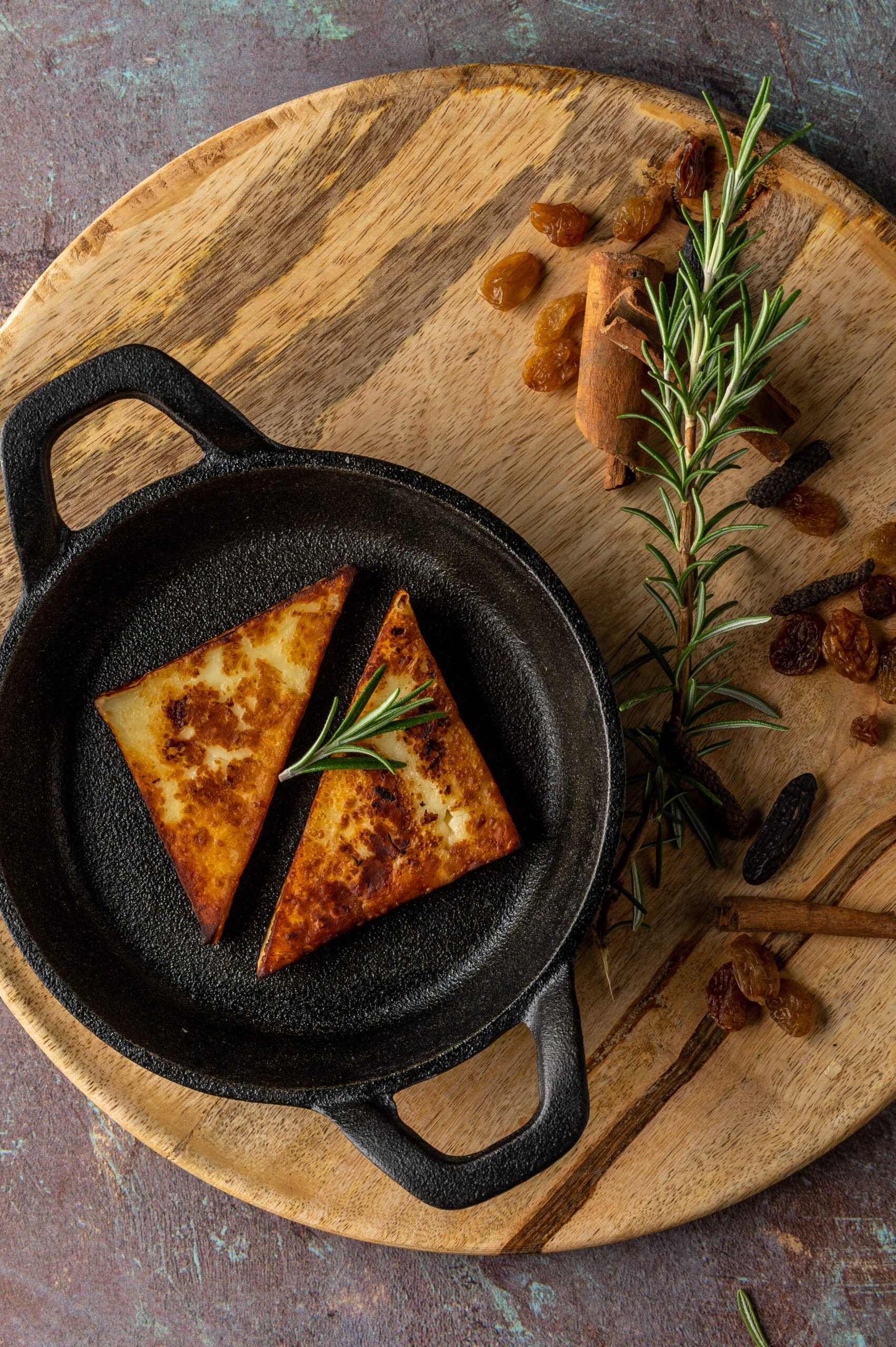Halloumi cheese is a dairy product originating from the Mediterranean island of Cyprus. It has been an essential gastronomic component of the Cypriot diet and culture. Its versatility in the kitchen and its ability to adapt to various culinary preparations has made it a popular ingredient in international cuisines.
The traditional preparation of halloumi involves the use of sheep’s and goat’s milk. In some cases, cow’s milk is also used. The combination of these milks gives the cheese its characteristic salty taste and firm texture.
What is halloumi cheese?
Halloumi cheese is a semi-hard dairy product that has been produced for centuries in Cyprus. One of the most remarkable particularities of halloumi is its unique ability to withstand high temperatures without melting completely. This is due to its high melting point, which allows it to be cooked, roasted or fried without losing its shape, thus developing a crispy golden coating on the outside.

Types of halloumi
Thanks to being an internationally known and increasingly important product in the kitchen, it has acquired multiple variants that give it greater value and versatility. As well as being made with goat’s and sheep’s milk, there are other types of confectionery such as:
- Cow’s halloumi cheese. It is very common for cow’s milk to be added. This gives it a slightly different taste and texture.
- Halloumi with herbs. This is a combination of the original cheese with herbs, which give a fresh touch and a distinctive taste to the halloumi. One of the most commonly used herbs in this combination is mint.

- Smoked halloumi. In some cases, halloumi is smoked. This process gives the cheese an additional layer of complexity and a distinctive aroma.
- Cheese with chilli or spices. Another variation of halloumi cheese may include the addition of chillies or other spices to give it a spicy or more aromatic touch.
- Low-fat. For those on a diet who want to consume halloumi cheese with fewer calories, there is a low-fat version of halloumi cheese.

Halloumi cheese nutrients
Halloumi cheese is a source of nutrition that has multiple health benefits for the human body. Here are some key nutrients that halloumi cheese provides.
Source of calcium
This cheese contains an excellent source of calcium which benefits the bone and dental health of the human body. Calcium is essential for maintaining strong bones and supporting clotting, muscle tissue and the nervous system. Thanks to this mineral, bone diseases can be prevented.
It also contains phosphorus, another important mineral that works together with calcium in the formation and maintenance of bones and teeth.
Protein
Halloumi cheese is a good source of high quality protein, which is essential for cell building, growth and repair in the body.
Vitamins
Halloumi cheese can provide B vitamins, such as B12, which is essential for the formation of red blood cells and the proper functioning of the nervous system.
Source of energy
Thanks to its fat and protein content, halloumi cheese becomes a sustained source of energy, providing calories necessary for the body’s daily functioning.

Tips on how to use it
Preparing halloumi cheese properly is key to bringing out its flavour and texture. It is therefore advisable to follow these tips.
- Soak it. Before cooking halloumi, you can choose to soak it in water to reduce the salt content. This helps to balance the flavour and prevents the cheese from becoming too salty.
- Cutting. Then cut it to taste for preparation.
- Drying. The cheese should then be dried thoroughly. This will promote the formation of a golden, crispy layer during cooking.
- Marinating. This step is optional, it can be marinated before cooking to add more flavour.
- Cooking. This is the last step before plating. Halloumi cheese can be cooked on the grill or in a frying pan. The key is to get it browned and crispy on the outside and tender on the inside.
Dishes to use halloumi cheese in
Thanks to the versatility of halloumi cheese, it lends itself to a wide variety of hot and cold dishes. Here are some suggestions of dishes in which you can enjoy the delicious taste and unique texture of halloumi cheese:
- Salads. Cheese always gives a distinctive taste and texture to salads. That’s why adding grilled halloumi to fresh salads with cherry tomatoes, cucumber, kalamata olives and green leaves is a very valid option.
- Wraps. Placing halloumi strips in wraps along with fresh vegetables, dips and meat is a tasty and satisfying option.
- Skewers. Grilling pieces of halloumi on skewers with vegetables creates an irresistible combination of flavours and crunchy textures.
- Sandwiches. Another option is to add halloumi to sandwiches for a mellow texture and savoury flavour. Combine it with roasted vegetables and any toppings for a special taste.
- Paste. Add halloumi to pasta dishes such as lasagne or macaroni for a unique twist. It pairs well with tomato or herb-based sauces.
- Appetizers. Using halloumi as a grilled or roasted appetizer, accompanied by honey, nuts or jam, is an ideal sweet and savoury combination for inviting friends over.
Premium brand
Halloumi cheese is highly appreciated in Mediterranean kitchens for its particular taste, its texture and its nutritional benefits. To taste this cheese of Cypriot origin, it is essential to have a pack of the premium brand METEORA.
Halloumi cheese is well known for its many virtues that make it unique such as its firm and elastic texture, its culinary versatility and unique salty taste and its high melting point to keep its shape.
METEORA is a leading cheese manufacturer. It produces cheeses of the highest quality. Thus, making traditional recipes and raw materials that guarantee benefits and the authentic halloumi flavour available all over the world. This cheese is available in tablets of 200 grams or in 550 grams.


